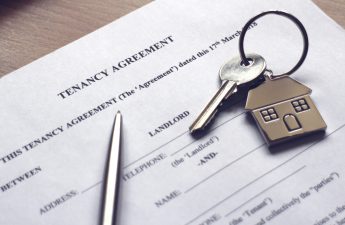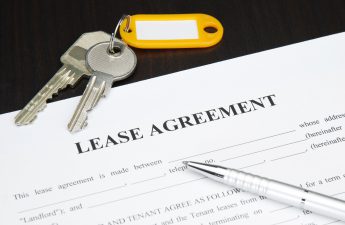In this next video, founders Chris and Eli discuss setting up a lease. Once you find the right applicant, it’s time to draft up a lease. They discuss the things that they look for in a lease, as well as various topics that you should address.
Topics in this video include:
- Tenants who are not accepted [0:23]
- Starting the lease creation process [1:23]
- Things to look for in a lease [3:06]
- State-specific leases [3:28]
- Additional things to include in your lease [6:02]
Transcript
Chris Lee: Hi there. Welcome back to Landlord Gurus. We got Chris and Eli here. We’ve previously been talking about finding a new tenant. In the last episode, we talked about the screening process. So we’re at the point now where you run people’s credit reports and background checks, and you’ve identified a new tenant for your rental. And I guess before that, if you found applicants who did not qualify for whatever reason, whether it was their credit check or their references or whatever, you do need to give them notice that they were not accepted to your rental.
In some cases, if it’s based on their credit report, you have to submit to them an adverse action notice. And just real briefly, that notice will say something like, “You’ve been denied. Here are the reasons why: on your credit report, this was the agency that did the report, and here’s their contact info, and you have the right to obtain a copy of your credit report and challenge any of that.
That is just one of the requirements, that you need to let them know why they are not accepted. And once you’ve done that and you move on to an applicant that has been accepted, you agree to terms and you begin the whole lease creation process.
Eli, you’ve done this many times, I as well have. What do you do to get things started in that regard?
Eli Secor: So, hopefully, it’s been covered in the screening process, but before you move on to signing a lease, it’s really important to make sure that you have photo ID verification from all of the adult tenants that will be living in the unit.
You also definitely need to have the name of all adult tenants on the lease so that every one of them is responsible for the terms of the lease, and no one of them can opt-out and kind of leave you on the hook. So making that official, verifying those IDs, so you make sure that you know who’s gonna be there and it’s documented. So, that’s the next step.
CL: Okay. I’ll just interject that the tenant screening software that I use does do an ID check on their end before they even apply, so that once I do get their report, that I know that the person who has applied is actually them.
So I don’t actually do an ID check before the lease. And a lot of property management software probably does the same. I know that’s why you like to use Avail, because once they’ve submitted their application, it’s easy to have their data already inputted.
ES: And you use?
CL: I use ApplyConnect.
ES: Which is a little bit more focused software than I use.
CL: Just tenant screening.
![]() Also Read: The Best Tenant Screening Service for Small Landlords
Also Read: The Best Tenant Screening Service for Small Landlords
ES: Yeah, tenant screening. So I use Avail which walks you all the way from advertising through lease signing and maintenance management and that type of thing. Avail also requires a photo ID upload as part of the application and screening process.
CL: What other sort of things do you look for in a lease? Or if you’re not using a lease from a software provider and you’re coming up with your own leases, what information do you feel needs to be in there?
![]() Also Read: Understanding Rental Lease Agreements: A Landlord’s Guide
Also Read: Understanding Rental Lease Agreements: A Landlord’s Guide
ES: Yeah. No matter where your lease is coming from, you need to make sure that it is relevant to local laws. Some of the things to look for that are common laws that are specific to locations are what occupancy limits are. So you can’t say, “Only one person can live in this unit,” here in Seattle.
There are rules. Family members are always allowed. Generally, roommates are allowed. You gotta make sure that you also outline all the deposits that are required and any fees because those will be limited in some places. You want to make sure that it’s communicated.
How notices are going to be served and what the terms of those are. For example, late payment. There will be grace periods and those vary from location to location. The last thing that comes to mind is what happens when the lease term ends? Does it go automatically to month to month?
Does it end? Is that allowed in your location or are you required to renew? Which is true here in Seattle. So those are some of the local issues that come to mind.
CL: Yeah. And those are just a handful. It really depends on where you are. But there could be a pretty long list and it’s hard to keep up with that, for sure.
ES: It is, I use Avail. There are a number of products out there that do, quote-unquote 50 state leases. Lawyers have reviewed the lease requirements in each of the states and have tailored leases for those. In a place that’s really restrictive Seattle, Portland, San Francisco, in particular, and a few other states.
It really pays to know the particulars and what’s current so that you can make sure to add to those if you need to.
CL: Yeah. And you know, what happens if you are using a non-state-specific lease? There could be a lot of ramifications in terms of a lease not being valid, in terms of you violating renter’s rights.
You could set yourself up for a lot of headaches down the road if you don’t use a state-specific lease.
![]() Also Read: 6 Reasons to Create State-Specific Lease Agreement Forms Using Property Management Software
Also Read: 6 Reasons to Create State-Specific Lease Agreement Forms Using Property Management Software
ES: Hopefully no lease out there violates the Fair Housing Act. That would be a very bad lease. But, again, occupancy and deposit requirements and notices. Yeah, you can easily run afoul of those things and cause trouble and sometimes hefty fines.
CL: What else do you look for in a lease? We’ve talked about local laws, but also, rights and responsibilities. They’re usually in there, in a standard lease, but things to look out for and you can add to this, you know, in terms of who’s responsible, if something breaks or who’s responsible for gardening, maintenance, things like that.
If you got that kind of stuff in the lease upfront, then you know there’s less question down the road should anything come up.
ES: A few things that often are in leases that come to mind are water beds. Allowed? Because there are flooding risks with that. So I’ve seen that. And whether or not satellite dishes are allowed or parking rules, that type of thing. So all these things can either be in a lease or if they’re not, then you can add them as addenda.
Good property management software providers will allow you to amend the lease so that you can add these rules. Alternatively, you can write up house rules and add that as an addendum, a separate file, a separate form. Things that might go into there are common area maintenance and rules, quiet hours, that’s usually in a lease. Also usually in a lease is the terms of what a tenant is supposed to do if they lock themselves out. So, who they’re gonna call. Almost all leases say you can call the landlord during these hours. And I try to cross that out or change it. I’ll say, “Landlord will supply access, if possible, for X dollars.
![]() Also Read: The Best Rental Property Management Software: Product Overviews
Also Read: The Best Rental Property Management Software: Product Overviews
In practice, I usually do it if I can, once. I don’t like to be called. They also can be required to call a locksmith. Lastly on that, what I’ve done is I’ve changed almost all my locks to punch pad. So what that means is that they almost never lock themselves out because they’ve got a code.
CL: Hopefully they don’t forget the code. But anyway, that’s another issue.
ES: That’s an easy thing for me to supply.
CL: Yeah, those are all great points. One more thing to add to the list of, you know, things like waterbeds, someone had asked in a previous video, what about aquariums? So I think that sort of falls in the same category and you can decide if you’re gonna allow waterbeds and if you’re gonna allow aquariums.
You’ve got a lease that now satisfies your requirements. It’s all legal and wherever you are, it’s time for signing. I like to use electronic signing and I think you do too. I would imagine most if not all, software property management software products like Avail have that built-in.
ES: TurboTenant. Yeah, all of the full-featured property management software products that have these leases will allow electronic signing, ideally. Which is what I love to do because I don’t have to go and stand there where somebody’s coming through a lease. And then, you know, I initial, you initial, I get it done and I send it off.
CL: And it’s safe and secure and it is legal. They are legally binding documents, electronics. Not all of our listeners, you know, understand that necessarily. It’s relatively new, but they are legally binding electronics.
ES: And they’re stored in the cloud so everybody can get to them really easily, they’re not buried in a file cabinet.
CL: You don’t have to go make a copy and bring it back to them.
ES: Yeah. It’s such a time saver.
CL: Those same products, once you sign the lease, might automatically then get them signed up for electronic rent payments, if that’s what you prefer.
ES: That’s what I do. I love it. It just goes seamlessly. The signing, then the tenant can initiate payment of the deposit as well as scheduling, and often auto-pay scheduling of rent payments going forward.
Let’s touch on that. We can go through rent payment and the various issues around that and options in our next episode.
CL: Yeah, in our next episode we’ll talk about rent. We’ll talk about letting the tenants in the first time, giving them the keys, whatever that whole process entails.
But yeah, we’ll end it for here. Thanks for watching. Please like, subscribe, and share it to everybody else. Look out for our next video. Thanks a lot.
ES: Thank you.
Disclosure: Some of the links in this post are affiliate links and Landlord Gurus may earn a commission. Our mission remains to provide valuable resources and information that helps landlords manage their rental properties efficiently and profitably. We link to these companies and their products because of their quality, not because of the commission.




